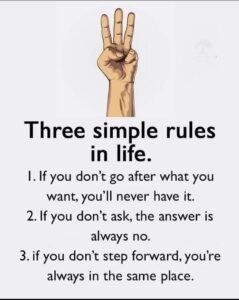What you do not want done to yourself, do not do to others. Confucius
This is a clarion call to practice temperance in both action and deeds. It is easy for us to be critical of others and to chasten people who do not meet our expectations of them. The classic example is that of most parents, who goad their children to study, frown at them when they are too playful and have an unrealistic expectations that the children must excel in academics consistently. If they only pause to reflect on their own childhood, schooling and performance perhaps they would realize that they are inflicting the very pain that they were subject to and possibly resented and detested.
Things don’t change too much in the general personal life, family life, professional life and social life. We sulk and resent others, who point out our faults and yet we won’t bat an eyelid when we are even more harsh with our spouse, children or family members when they make minor misdemeanors that we resent. As passive sports enthusiasts watching the players on TV how often do we criticize and curse players when they flounder at critical stages and how readily we find excuses for our mistakes and poor performance. Would we tolerate the same criticism if it was directed to us?
In our anxiety to get favorable output or results, we often become intolerant and too demanding. This results in us setting very stiff targets for performance leading to unrealistic expectations and failure is never treated kindly. Just pause and reverse the roles and ask a question if we can meet our own targets? If the answer is a loud no, then are we fair in being harsh, rude and possibly nasty to others; for we wouldn’t want to suffer the same fate under similar circumstances. So the yardstick we use for others must be the same one that you will judge yourself with. The rewards and punishments must also be in similar proportion to what you deserve.
Remember: The Lords prayer has a line that is the forerunner to the above quote ‘forgive us our sins as we forgive those who sin against us’.
Try these:
- The next time you go through the report card of your child, ask yourself what was your performance whilst in the same class. It is grossly unfair to expect your kids to extraordinarily well as compared to your own achievements. Also be careful not to compare performance of your child with that of another classmate. Comparison if any must be with the average class performance and the ability of your child.
- Any criticism, punishment, ticking off must be in proportion to the deed or offence. Ask yourself if you are letting your emotions get the better of you when you award a punishment or you criticize or tick of someone. Pay close attention to your choice of words, tone and timing too. Also ensure that any negative feedback is never given in public but done privately.
This post is courtesy www.actspot.com
You are also invited to visit our weekly Inspirational and Motivational Blog www.poweract.blogspot.com





